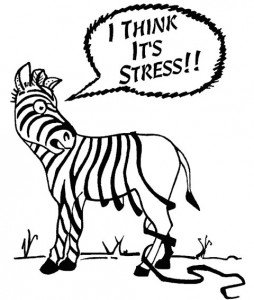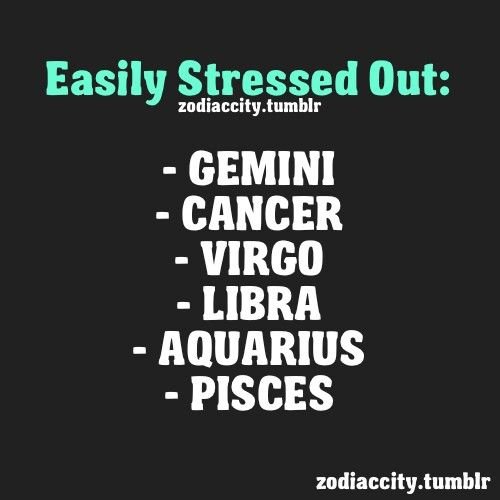A certain amount of stress is actually good for you. Psychologists call healthy stress "eustress" - it's the impetus behind clear, creative thinking and achievement. Sports people rely on the effects of eustress to help them surpass personal bests. However, when the pressure builds up eustress gets out of control and it becomes unhealthy stress. You feel overwhelmed and unable to manage rationally. You develop negative or self-defeating patterns, such as working too hard, oversleeping or waking up in panic, drinking and smoking, over- or under-eating. Unhealthy stress can lead to mental and physical exhaustion.
What happens when You're stressed
The fight or flight response is a complex chemical chain reaction, which affects the entire body immediately you suffer a shock. First the senses become heightened and the threat is magnified. Then the brain assesses information received and prepares the body for action. Hormones and electrical impulses flood both the voluntary and the autonomic systems.
At the centre of the brain the hypothalamus triggers the production of three main stress hormones. Adrenalin, produced by the adrenal glands, raises the heartbeat, blood pressure, breathing rate and blood sugar levels, energizing the body. Cortisol, also produced by the adrenal glands, increases the blood-clotting rate and energizes the organs by converting stored fat into glucose. The brain itself produces endorphins - natural opiates that kill pain and produce a euphoric "high".
Now you're all wired up, senses sharp as razors and muscles raring to go. So what's your next move? It is generally not appropriate to run away, punch the source of your shock or fall to the floor flailing and sobbing. So you make a superhuman effort to contain your feelings, thus denying both your mind and body the release it expects. Your system can dump a certain amount of the build-up. But if the stress is sustained or repeated over long periods, the body's self-defense mechanism turns inward and the self-destruction process begins.
Gauging your Stress threshold
How can you determine your "elastic limit" - the maximum you can take before you break? Personality plays a major role in determining your personal stress threshold.
Psychologists have identified two personality types which are most at risk of stress-related disease. The first is hard-working, impatient, competitive and aggressive, and is especially at risk of heart disease. The second is a perfectionist who may seem outwardly calm, cheerful and capable, but finds it hard to admit to feeling ill or under pressure.

Having established how much stress your personality can take you then need to look at the circumstances that tend to cause stress and see how many pertain to you. Use the scale to gauge your own current stress levels. If you score around 100 points, you have a 10 per cent increase in the risk of illness over the next two years. A score of 100 - 300 points means a 50 per cent increase, and 300 points or more indicates a dangerous risk. Consult your health practitioner if you are at all worried about your score.
100 Death of partner
73 Divorce
65 Separation from partner
63 Prison sentence
63 Death of close family member
53 Injury or illness to self
50 Marriage
47 Loss of job
45 Reconciliation with partner
45 Retirement
44 Illness in the family
40 Pregnancy
39 Arrival in the family
39 Major changes at work
39 Sexual problems
38 Change in finances
37 Death of friend
36 Change of job
35 More arguments with partner
31 Taking on a large mortgage
30 Mortgage or loan foreclosed
29 Change in workload
29 Child leaves home
29 In-law trouble
28 Major personal achievement
26 Partner starts or stops work
26 Child begins or ends school
25 Change in living environment
24 Change in personal habits
23 Problems with the boss
20 Change in working hours or conditions
20 Moving home
20 Child changes school
18 Change in social activities
16 Change in sleeping habits
15 Change in number of family reunions
15 Change in eating patterns
13 Going on holiday
12 Approaching Christmas
11 Minor violations of the law
Ten ways of Dealing with STRESS
Talk about it. Where you feel you can, discuss your problems with your partner, close friend or a therapist in order to see the situation more objectively.
Please yourself. Make sure you do something you really enjoy at least once a day.
Laugh it off. Laughter is a fabulous healer and encourages social bonding. The act of laughing also increases the oxygen supply to the lungs, stimulates the production of endorphins and can produce a feeling of euphoria. Occasionally it may also open the gates to tears - another positive release.
Exercise. Burn off the energy that stress generates before it burns you up.
Say No. Make space for yourself and get some respect. State your opinions clearly and calmly. Don’t wait to be asked, then feel angry and overlooked if you’re not.
Be creative. Woman often feel stressed, frustrated and depressed when family or business management pushes creativity out of the picture. Taking up a stimulating new interest helps you to keep an open and progressive mind.
Get Real. Accept your personality, don’t try to alter it. Instead, learn to manage your strengths and weaknesses. Likewise, stop chastising yourself for past mistakes. Learn from them – then let them go.
Plan and Prioritize. Organize your life better by tackling important issues early to get them off your mind,
and don’t take on too much.
Think Positive. Approval-seeking and self-doubt both erode self-esteem. Tell yourself you can do things
not merely to stay popular but because you genuinely enjoy them.
- Be kind to yourself. When you’re stressed, give yourself physical and emotional support. Treat yourself to favorite foods. Pamper yourself in an aromatherapy bath, book in for a massage or one of the many other stress relief therapies available or try meditation, yoga or pilates classes.
© Dee Coote
Dee is a Freelance Journalist, Holistic Living Counsellor / Coach with qualifications in numerous therapies. She is also an astrologer, tarot reader, course facilitator, a zealous researcher and keen human rights activist. Dee has been working in private practice and in the financial management /coaching area with private businesses since 2002.
Website: www.purespiritsavvy.com You Tube Channel: Pure Spirit
I enjoyed the article and look forward to seeing more of your work.Hi Dee. I'm a health curator with SteemTrail. For me to consider recommending your posts, I'll need to see sources for your pictures listed. Also citations for any articles you are quoting. Here's our health-trail intro post https://steemit.com/health/@health-trail/introducing-health-trail-part-of-the-steemtrail-curation-initiative